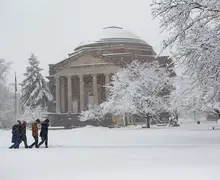Enhanced snow removal efforts, more heated sidewalks coming for winter
Kai Nguyen | Staff Photographer
SU’s Campus Facilities Administration and Services is responsible for maintaining the grounds, buildings, parking lots and other facilities on campus, according to their website.
Syracuse University’s Campus Facilities Administration and Services has developed a plan to increase campus safety and accessibility during winter months that will take effect this year.
The department has planned longer snow and ice clearance hours during winter; individualized snow and ice removal assistance; and more heated sidewalks on campus. This winter, the university’s snow removal crews will begin their shifts at 2 a.m. to ensure campus roads and sidewalks are properly cleared and salted.
CFAS is responsible for maintaining the grounds, buildings, parking lots and other facilities on campus, according to the department’s website.
Snow and ice buildup on and around campus often creates hazardous situations for commuters, said Lark Allen, an SU graduate student and lifelong Syracuse resident. Each day, Allen walks to SU from the Westcott neighborhood, which takes about 20 minutes in ideal weather, she said. During the winter, her commute time increases to at least 30 minutes.
“I have to make sure I’m super bundled up, and I have to leave way earlier, too,” Allen said. “I really have to plan ahead for that kind of thing.”
Allen doesn’t alter her route during the winter. The delays come from walking slowly to avoid slipping on black ice, which has happened to her before on busier streets like Euclid Avenue. Allen said Syracuse streets often feel like an “ice rink.”
Students are not the only ones who deal with messy winter commutes. Jodi Upton, a professor at the S.I. Newhouse School of Public Communications and a senator on University Senate’s Committee on Student Life, walks about a mile during her commute to SU.
The Committee on Student Life works to maintain an equitable environment for SU students across a variety of areas, including physical campus access. While the Senate didn’t directly vote on the measure, Upton said the winter accessibility project was “a collective idea” among various campus organizations.
Upton said that the new accommodations will help make SU more accessible during the winter. She identified a need for cooperation between SU and off-campus agencies for even further improvements. She suggested recruiting student volunteers or other organizations to work with city officials, landlords and homeowners to make sure the city streets and sidewalks around SU are free of snow and ice.
“To me, if we’re going to deal with accessibility, we need to make sure that partnership is around, too,” Upton said.
The enhanced on-campus winter accommodations will help make SU’s campus more easily accessible and reduce the risk of injury when the campus is crowded during the wintertime, Allen said. She also said while winter campus safety is important for everyone, it is especially critical for those who are new to the Northeast and unfamiliar with traveling in icy conditions.
“It’s a good step in the right direction,” Allen said. “I totally support them doing whatever they have to do to make the campus better-accessible to people who aren’t used to harsh winters.”
Published on September 19, 2019 at 12:19 am
Contact Sarah: [email protected]


